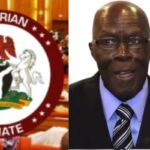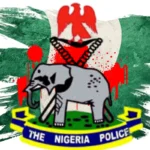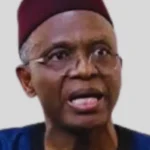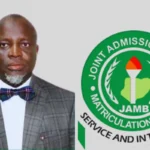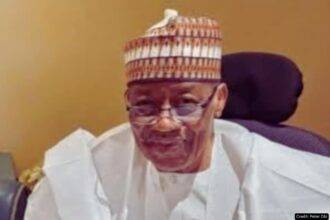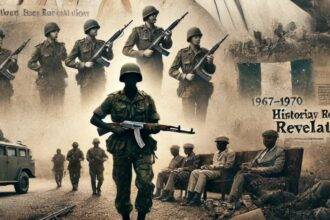The Biafra War, officially known as the Nigerian Civil War (1967–1970), was a defining moment in Nigeria’s history, exposing the fragile foundations of a newly independent nation. Sparked by deep ethnic divisions, political instability, and economic competition, the conflict pitted the secessionist Republic of Biafra, led by Colonel Chukwuemeka Odumegwu Ojukwu, against the Nigerian federal government under General Yakubu Gowon. Over a million people—primarily civilians—lost their lives due to warfare, famine, and disease.
To fully understand the Biafra conflict, it is essential to examine the historical roots of Nigeria’s internal divisions. The colonial legacy of ethnic manipulation, the tumultuous transition to independence, and a series of political crises combined to ignite one of Africa’s bloodiest civil wars. This article delves deep into the ethnic tensions and political rivalries that fueled the Biafra War, offering insight into how historical fractures led to a devastating conflict.
Nigeria’s complex ethnic landscape was deeply influenced by British colonial policies. Prior to colonialism, the region now known as Nigeria was home to diverse kingdoms, city-states, and ethnic groups, including the Hausa-Fulani in the North, the Yoruba in the West, and the Igbo in the East. British colonizers, seeking to streamline administration and exploit resources, merged these culturally distinct regions in 1914 through the amalgamation of the Northern and Southern Protectorates.
The British employed a “divide and rule” strategy, governing the North through indirect rule via traditional leaders while imposing Western-style administration in the South. This approach entrenched regional disparities:
Northern Nigeria remained largely conservative and Islamic, with limited Western education.
Western Nigeria (Yorubaland) experienced moderate modernization and political organization.
Eastern Nigeria (Igboland) became a hub for Western education and Christian missionary activity, fostering a competitive, entrepreneurial society.
This uneven development sowed seeds of distrust and rivalry among Nigeria’s major ethnic groups, creating a fragmented society ill-prepared for unity after independence.
As Nigeria moved toward self-governance in the 1950s, political mobilization followed ethnic lines. The major political parties became regional strongholds:
Northern People’s Congress (NPC) dominated the North and was primarily Hausa-Fulani.
Action Group (AG) controlled the West, representing Yoruba interests.
National Council of Nigerian Citizens (NCNC) was the Eastern stronghold, largely supported by the Igbo.
The fierce competition among these parties for political dominance heightened ethnic suspicion. The 1953 Kano riots—triggered by disputes over Nigeria’s timeline for independence—highlighted growing ethnic animosity, especially between the North and South.
Additionally, economic disparities widened as the South, particularly the East, rapidly modernized while the North lagged behind. This imbalance further deepened ethnic divisions and fueled fears of domination by more advanced regions.
On October 1, 1960, Nigeria gained independence with high hopes for unity. However, the post-independence period was marred by political infighting and regional rivalries. The federal structure, designed to balance power among regions, instead intensified competition for control of resources and political influence.
Corruption, electoral manipulation, and violent suppression of opposition became rampant. The Western Region experienced severe political turmoil, culminating in the “Wild Wild West” crisis marked by violence and lawlessness. These issues weakened national cohesion and exposed Nigeria’s fragile unity.
The political instability reached its peak with Nigeria’s first military coup on January 15, 1966. Led by predominantly Igbo officers, the coup resulted in the assassination of key northern and western leaders, including Prime Minister Abubakar Tafawa Balewa and Northern Premier Ahmadu Bello.
Though Major General Johnson Aguiyi-Ironsi, an Igbo officer, became Head of State, his failure to punish coup plotters and his push for a unitary government fueled suspicions of Igbo domination. This perception intensified ethnic resentment, particularly in the North.
In July 1966, a retaliatory coup led by northern officers overthrew and assassinated Aguiyi-Ironsi. This sparked violent pogroms in the North, where tens of thousands of Igbo civilians were massacred. These atrocities deeply entrenched the Igbo sense of persecution and further fractured national unity.
In the wake of widespread killings and growing insecurity, Lt. Colonel Chukwuemeka Odumegwu Ojukwu, the Eastern Region’s military governor, demanded greater autonomy for the East. Attempts at reconciliation, notably the Aburi Accord in Ghana, failed due to mistrust and disagreements over the implementation of agreements.
Feeling cornered and believing that the safety of the Igbo people could no longer be guaranteed within Nigeria, Ojukwu declared the Eastern Region an independent nation—the Republic of Biafra—on May 30, 1967. This act of secession set the stage for war.
The declaration of Biafra’s independence was met with swift condemnation from the Nigerian federal government, which viewed it as a threat to national unity. General Yakubu Gowon imposed economic sanctions and launched a full-scale military offensive to reclaim the Eastern Region.
For Biafra, secession was seen as a last resort for self-preservation. For Nigeria, it was a battle to preserve the territorial integrity of the nation. Thus began a brutal three-year war marked by heavy casualties and widespread suffering.
Oil was a critical factor in the conflict. The Eastern Region was rich in oil reserves, primarily in the Niger Delta. Control over this vital resource was central to Nigeria’s determination to prevent secession. Western oil companies, including Shell-BP, had substantial investments in the region, influencing international attitudes toward the conflict.
For Biafra, losing international access to oil revenues crippled its war efforts, while Nigeria leveraged its oil wealth to finance military operations and secure foreign support.
Global Cold War dynamics influenced international responses to the conflict. The Nigerian government enjoyed support from Britain and the Soviet Union, both prioritizing Nigeria’s unity and oil stability. France provided limited support to Biafra, but most nations feared that recognizing Biafra could encourage other secessionist movements in Africa.
Biafra’s effective propaganda highlighted the humanitarian crisis, drawing sympathy but little official support. The war became a case of political interest outweighing humanitarian concerns.
The Biafra War was not merely a military confrontation; it was the violent manifestation of unresolved ethnic tensions, political mistrust, and economic competition rooted in colonial mismanagement. Decades after the war, Nigeria continues to grapple with issues of ethnic marginalization, resource control, and political instability.
The war serves as a stark reminder of the need for inclusive governance, equitable resource distribution, and genuine national reconciliation. Addressing these issues remains critical to preventing future conflicts and fostering unity in Nigeria.
Understanding the roots of the Biafra conflict is essential not only for historical reflection but also for charting a more peaceful and prosperous future for Africa’s most populous nation.

